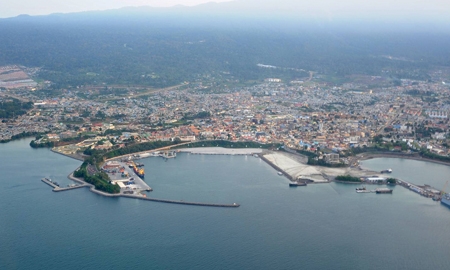No discussion on Equatorial Guinea’s growth spurt would be complete without mentioning the engineering and construction firm, Somagec. Established in Morocco in 1962, this leading African maritime infrastructure company has played a vital role in EG’s expansion for eight years. Indeed, it has undertaken so many projects and taken on so many workers, that it has become the largest non-oil company and single largest private employer in the country.
Somagec takes pride in being African and as Jean Charles Hayoz, Administrative and Financial Director of
Somagec GE, explains, it is “a real example of what an African corporation can be.”
By offering the most cost-competitive bids and by taking a long-term investment approach – as opposed to an exploitive, “financial colonisation” one which is often the case when European and American companies win the tenders – Somagec has become a true partner and investor in Africa’s future.
“Today people are ready to earn a lot of money on the back of Africa, but they are not really ready to invest. But we as Somagec have invested €450 million in Guinea. There is not one European company that has been working here for 25-30 years which has invested even half of what we have done in eight years,” highlights Mr Hayoz.
In Equatorial Guinea, the company functions like a local company rather than an offshore one. This essentially means that all equipment, vehicles etc. that Somagec acquires for its works will remain as Guinean assets.
“When I finish, if I am an offshore company, I take everything and then go back. But we agreed to stay in Guinea and for all equipment to stay in Guinea,” explains Mr Hayoz, adding that 85 per cent of what Somagec is paid also stays in country. Offshore companies, in contrast, generally repatriate that amount.
Somagec is helping EG to realise its potential as a transport and transhipment hub. By importing the advanced technology it has developed specially for the construction of modern harbours – including Tanger-Med, the deepest port in Africa – the firm has completed ports in Annobon, Malabo and Kogo, as well as an extension of the port in Bata.
Its expertise is not limited to seaports, however; Somagec has also built, upgraded and expanded the airports at Annobon, Corisco, Malabo and Bata.
Ongoing projects in transport infrastructure include the extension of the western dock at Malabo Port, the building of a dock in Akoniki and a port in Corisco, and the building and surfacing of a new 12km road between Kogo and Akelayong and another 42km road from Akogo to Cabo San Juan.
Beyond transport infrastructure, Somagec is also addressing pressing social needs. “We are now engaged with rubbish collection and we have created a company called Guinea Limpia [Clean Guinea]. There are lots of things that need to done, like water distribution etc.,” says Mr Hayoz.
“Drinking water from the tap has been possible in Bata since July 2011. On the inaugural day, we were drinking water from the fountain in Bata with President Obiang.”
Somagec is now working on a wastewater sewerage project in Bata, and drinking water systems in Bata and Annobon.
Having seen other oil-rich countries fail over time due to an over dependence on a single resource, EG’s government is working towards economic diversification, considered key to sustainable growth. For the Somagec director, one area the country should develop is tourism. Mr Hayoz states: “This region has a lot of tourism potential, with beautiful landscapes and virgin land.”
No doubt Somagec’s new roads, ports and airports, as well as the clean drinking water systems will serve the tourism industry well. The Moroccan/Guinean firm has also embarked on beautification projects, like maritime walks in Malabo and Kogo, shaping and protecting the Enrique Island, Sipopo and Bata beaches, and the construction of Media Luna Hotel in Bata.
Somagec is in EG for the long haul, as can be further seen by its commitment to training Equatoguinean workers. “We are not just committed to finalising the work the government gives us, but also to training the future generation,” underscores Mr Hayoz.
“We have a special internal promotion and we send good workers to Morocco to see how things are there and the fruits of each worker. We have set the foundations for the future generation. We are committed to this with the government.”

0 COMMENTS